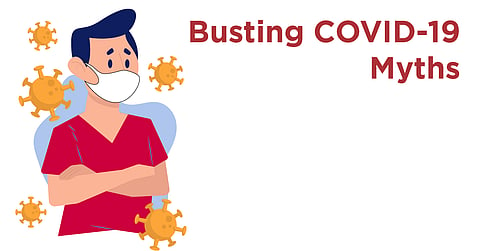This quick fact-check will bust all myths around COVID precautionary measures
With COVID cases on a rise, the threat of pandemic is still looming over us and, it's time we start ensuring appropriate precautions without waiting for official orders. While the importance of masks, and sanitizers are now known to all, there are also several misconceptions and myths pertaining to the COVID precautionary measures. And with this myth-buster, you can steer clear of them all.
Busting the Myths around COVID-19 precautions
Myth: Hand sanitisers should not be used frequently
FACT: Unlike other antiseptics and antibiotics, an alcohol-based hand sanitiser DOES NOT create antibiotic resistance. As per the study by WHO, the COVID-19 pathogen does not develop resistance to alcohol-based sanitisers, making it effective in cleaning such germs.
Myth: Alcohol-based sanitisers are not safe for children or elderlies
FACT: Alcohol in the sanitisers DOES NOT create any relevant health issues. A little alcohol is absorbed into the skin, and most part contains the solution to reduce skin dryness. Skin irritation and bleaching of hand hair due to alcohol are very rare adverse effects. However, accidental swallowing and intoxication can create trouble, so ensure proper use.
Myth: Wearing gloves is safer than cleaning your hands frequently
FACT: Wearing gloves INCREASES the risk of transferring the contaminant from one surface to another. More so, it also exposes your hand to the virus when used to remove gloves. As per the WHO direction, using gloves should be avoided and proper cleaning of hands should be considered the best way to avoid any contact with the germs.
Myth: Touching a common bottle of alcohol-based sanitiser will infect you
FACT: Using the bottle of alcohol-based sanitisers in public spaces sounds risky. However, if you've sanitized your hands using the communal bottle of alcohol-based sanitisers you have disinfected them from any germs that may have been on the bottle. This ensures a healthy public environment.
Myth: COVID-19 transmits from water or while swimming
FACT: The COVID-19 virus DOES NOT transmit through the water while swimming. The virus only spreads between people when in close contact with the infected person.
Myth: The prolonged use of medical masks causes CO2 intoxication and oxygen deficiency
FACT: The prolonged use of medical masks when properly worn, DOES NOT cause CO2 intoxication nor oxygen deficiency. Though the prolonged use of such masks can be uncomfortable for some people. So, while wearing a medical mask, make sure it fits properly and is tight enough to allow you to breathe normally. Make sure to not re-use a disposable mask and always change it as soon as it gets damp.
Myth: Masks interfere with a child's lung development
FACT: Wearing a face mask will NOT affect the development of lungs in children. Instead, it is one of the most effective measures to keep your lungs healthy. A face mask does not hinder the flow of oxygen, however, blocks the spray of spit and respiratory droplets that may contain the virus.
Myth: Prolonged usage of masks does not lead to a weaker immune system by putting the body under stress
FACT: Wearing a face mask DOES NOT play any role in weakening your immune system or increasing your chances of getting sick if exposed to the COVID-19 virus. Wearing a mask, even if you do not have symptoms of COVID-19, helps prevent the virus from spreading.
Myth: Exposing yourself to the sun or temperatures higher than 25°C can protect you from COVID-19
FACT: As per WHO directive, one CAN catch COVID-19, no matter how sunny or hot the weather is. In fact, countries with hot or humid weather have reported a higher number of cases. In order to protect yourself, make sure you clean your hands frequently and thoroughly and avoid touching your eyes, mouth, and nose.
Myth: The COVID-19 virus also spreads through mosquito bites
FACT: To date, there has been NO information or evidence that suggests the spread of novel coronavirus by mosquito bites. COVID is a respiratory virus that spreads primarily through droplets generated when an infected person coughs or sneezes.
Myth: Antibiotics prevent or treat COVID-19
FACT: As the name suggests, Antibiotics work only against bacteria and NOT viruses. COVID-19 is caused by a virus, and therefore antibiotics should not be used for the prevention or treatment of any patient. Antibiotics may be recommended in cases where someone catches COVID-19, leading to the development of a bacterial infection as a complication.
To get all the latest content, download our mobile application. Available for both iOS & Android devices.

